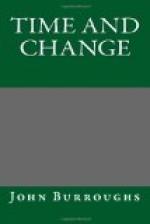The hazard of the future is a question of both astronomy and geology. That there are cosmic dangers, though infinitely remote, every astronomer knows. That there are collisions between heavenly bodies is an indubitable fact, and if collisions do happen to any, allow time enough and they must happen to all. That there are geologic dangers through the shifting and crumpling of the earth’s crust, every geologist knows, though probably none that could wipe out the whole race of man. The biologic dangers of the past we have outlived—the dangers that must have beset a single line of descent amid the carnival of power and the ferocity of the monster reptiles of Mesozoic times, and the wholesale extinction of species that occurred in different geologic periods.
Nothing but a cosmic catastrophe, involving the fate of the whole earth, could now exterminate the human race. It is highly improbable that this will ever happen. The race of man will go out from a slow, insensible failure, through the aging of the planet, of the conditions of life that brought man here. The evolutionary process upon a cooling world must, after the elapse of a vast period of time, lose its impetus and cease.
XIII
THE GOSPEL OF NATURE
I
The other day a clergyman who described himself as a preacher of the gospel of Christ wrote, asking me to come and talk to his people on the gospel of Nature. The request set me to thinking whether or not Nature has any gospel in the sense the clergyman had in mind, any message that is likely to be specially comforting to the average orthodox religious person. I suppose the parson wished me to tell his flock what I had found in Nature that was a strength or a solace to myself.
What had all my many years of journeyings to Nature yielded me that would supplement or reinforce the gospel he was preaching? Had the birds taught me any valuable lessons? Had the four-footed beasts? Had the insects? Had the flowers, the trees, the soil, the coming and the going of the seasons? Had I really found sermons in stones, books in running brooks and good in everything? Had the lilies of the field, that neither toil nor spin, and yet are more royally clad than Solomon in all his glory, helped me in any way to clothe myself with humility, with justice, with truthfulness?
It is not easy for one to say just what he owes to all these things. Natural influences work indirectly as well as directly; they work upon the subconscious, as well as upon the conscious, self. That I am a saner, healthier, more contented man, with truer standards of life, for all my loiterings in the fields and woods, I am fully convinced.
That I am less social, less interested in my neighbors and in the body politic, more inclined to shirk civic and social responsibilities and to stop my ears against the brawling of the reformers, is perhaps equally true.




